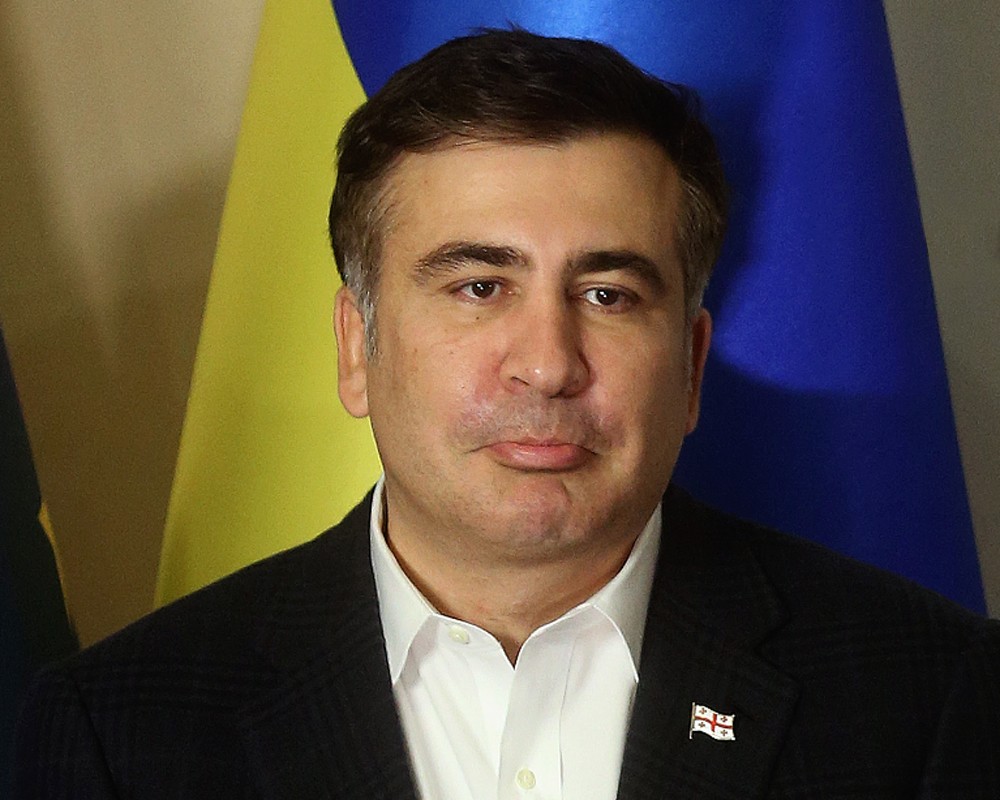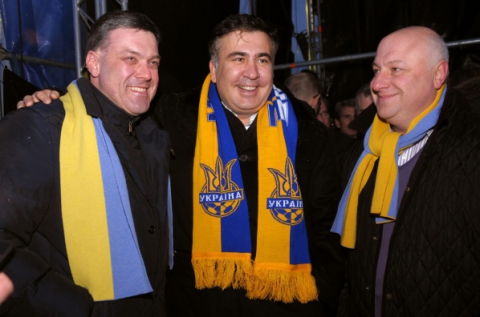From Georgian President to Ukrainian Governor: Saakashvili’s Endevours Take New Turn
865 views / 10 Jun 2015
By Matt Lerner
There is little in common between Russia and Georgia these days. While the two neighbours have mellowed out somewhat since the brief war between them in August 2008, there is still considerable tension. However the two do share one trait in common at the moment: an intense dislike for Mikheil Saakashvili, the outspoken former President of Georgia.
Since leaving office in 2013, Saakashvili has strived to ensure his name remains relevant, making enemies in both Moscow and Tbilisi in the process. This has had the bizarre consequence of making both Russia and Georgia actually agree on one thing, even if that thing is an intense hatred of the man known to his friends as Misha.
Odessa residents bring ties to mark Saakashvili’s arrival
It should come as no surprise that Russia, especially Vladimir Putin, does not like Saakashvili. After all he represents everything Putin stands against: Saakashvili is young, Western-educated and supported, and most importantly had key allies within the United States government, former presidential candidate John McCain being the most prominent. It was Saakashvili, who came to power in a bloodless revolution that overthrew former Soviet foreign minister Eduard Shevardnadze in 2003, sparking the coloured revolutions, that led Georgia during the 2008 war; he also managed to sell the world on the idea that Georgia had been invaded in an unprovoked attack by the much larger Russia, appearing on Western television and addressing the media in fluent English.
https://twitter.com/Russ_Warrior/status/605445615020089344
Saakashvili also willingly left office once his constitutionally-mandated term expired in 2013, allowing for the first peaceful transition of power in modern Georgia. This was made even more notable because it meant that the opposition party, founded and led by billionaire Bidzina Ivanishvili, was given the offices of both president and prime minister (Ivanishvili was elected as the prime minister in 2012). This peaceful transfer of power, especially to a contentious enemy (Saakashvili and Ivanishvili clashed frequently in their year together), must have not pleased Putin in the least [the author believes that Saakashvili, unlike Putin, didn’t seek the consecutive presidential term and left his office in a democratic fashion, instead of trying to stay in power by any means necessary – editor].
As noted, Saakashvili was not close to Ivanishvili (who, despite resigning as the prime minister shortly after Saakashvili left office, is seen to largely control the Georgian government as a sort of a puppet master), nor the rest of the Georgian Dream [the current ruling coalition of political parties, centered around Ivanishvili’s Georgian Dream party – editor]. This was proven when an arrest warrant was issued in Georgia for Saakashvili soon after he finished his term; while it ostensibly refers to his harsh response to a protest in 2007 against his presidency, many observers see it as vengeance against a hated figure. As a result, Saakashvili has not returned to Georgia since 2013, though he has openly mocked the Georgian government in the process by holding press conferences within sight of the Georgian border at Sarp, Turkey, the main border crossing between the two countries right along the Black Sea.
With little to do after exiting the presidency, Saakashvili found an opportunity with the Euromaidan revolution in Ukraine in 2013 – 2014. He eagerly supported the revolutionary forces, and made frequent appearances in front of the protestors in Kyiv, arguing for greater Western involvement. For his efforts Saakashvili was appointed as a special advisor to Ukrainian President Petro Poroshenko in February 2015, effectively tasked with soliciting Western support for the new Ukrainian government, which Saakashvili has insisted comes in the form of weapons and munitions.
This appointment managed to anger both Russia and Georgia, uniting them on something for the first time in a long while. Russia was angered that this perceived symbol of democracy in the former Soviet Union was actively lobbying Western governments to help Ukraine combat Russian-backed forces in the Donbas region. Considering the influence Saakashvili has within the American government, where his close friend and ally John McCain holds several key positions relating to foreign policy, it is a legitimate concern for Russia.
Tbilisi’s issue stems from the arrest warrant for Saakashvili. Upon his appointment as advisor to Poroshenko, the Georgian government asked via INTERPOL for the Ukrainian government to hand Saakashvili over, a request quickly denied by the authorities in Kyiv. A minor diplomatic incident occurred, and relations between Ukrainians and Georgians, who were one of the strongest supporters of Euromaidan (Georgian parliamentarians each had a Ukrainian flag on their desk in parliament during the protest), notably cooled. That Saakashvili has used his newly-found immunity to continue to critique the Georgian government has certainly not helped the issue, either.
Mikheil Saakashvili sings the Ukrainian anthem in Odessa
It will take a lot of negotiation and careful diplomacy before the relationship between Russia and Georgia is normalised, if it indeed ever happens. But to see the two parties readily agree that the appointment of Saakashvili as a member of the Ukrainian government is a bad idea may be one of the first steps towards working on this. At the very least, the two now have something in common they can discuss.
The views and opinions contained in this article are those of the author. They do not necessarily represent the views of Russian Accent.
comments (1)
POST A COMMENT
Your email address will not be published. Required fields are marked *


Putin dislikes Saakashvili not for being young well-educated and pro-US/Western. Saakashvili became “never-shake-his-hand-again” because of his provocative move to annex the break-away regions, which were under Russian protection.
There is no worry on Russian side about appointment of MS as governor of Odessa. Kiev is already bieng backed by US/West. Governor of Odessa calls merely laugh in Kreml and shame in Tbilisi. That’s it.